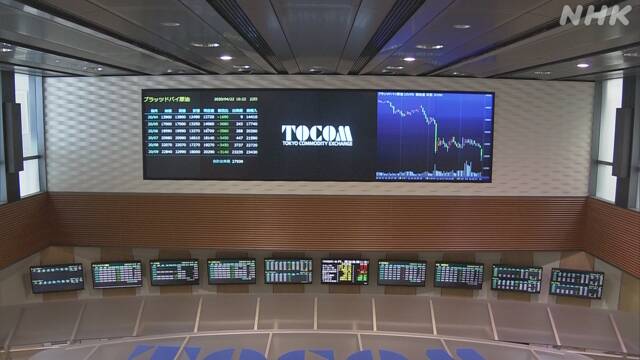Tokyo crude oil market low for the first time in 18 years The global economy stagnated due to new corona infection April 22 16:57
The Tokyo crude oil market on the 22nd will be the center of the transaction, and the futures price of September crude oil will temporarily drop by 32% from the closing price on the 21st to reach 16,000 yen for the first time in 18 years and 2 months. It fell significantly below.
The Tokyo crude oil market on the 22nd spurred sales orders and became the center of the transaction, and the futures price of crude oil in September was temporarily ¥ 15,710 per kiloliter, which was 7720 yen from the closing price on the 21st, It fell by 32%.
For the first time in 18 years and 2 months since February 2002, the price of crude oil futures fell below 16,000 yen.
After that, there was some buyback activity, and the closing price of crude oil futures prices was 16,240 yen, down 7190 yen from the closing price on the 21st.
The reason behind the decline is that the global economy has stagnated due to the spread of new coronavirus infections, demand for crude oil has fallen, and global overproduction is continuing.
In particular, on the 21st, WTI's June futures price, which is an international index in the New York crude oil market, plummeted to one-third of the previous day's level at $ 6 a barrel, and the London crude oil market. However, as crude oil futures prices have fallen sharply, the low price of crude oil is spreading worldwide.
A market official said, “Demand for crude oil will continue to remain weak unless the spread of infections subsides. With the situation of unbalanced supply and demand, which will not stop price declines, it is expected that oil-producing countries will continue to reduce production. ".
Bank of Japan cautions that it may lead to financial instability
The Bank of Japan is increasing its caution that financial institution management could be damaged if the real economy deteriorates and crude oil prices continue to plummet due to the spread of the new coronavirus, which could lead to financial instability.
In the “Financial System Report” released on the 21st, the Bank of Japan analyzed the impact of the spread of the new coronavirus, and one of the risks that Japanese financial institutions have is to lend to companies with low creditworthiness in Japan and overseas. I mentioned.
In recent years, Japanese financial institutions have increased their investment and lending overseas, mainly in the United States, in order to obtain even higher yields despite the prolonged low interest rates.
As of September last year, the loans outstanding of three major banks in the North American region reached 207.4 billion dollars (22 trillion yen or more), which was about 1.7 times that of 2013 when the Bank of Japan started large-scale monetary easing measures.
As a result, high-risk lending has increased, and the proportion of loans to “electricity, gas, and energy,” including shale oil companies in the United States, which have particularly low creditworthiness, is higher than other industries.
The entire financial system is now stable, with central banks around the world taking additional monetary easing last month when the new coronavirus spread and the financial markets were upset last month.
However, if the crude oil prices continue to plummet and the management of petroleum-related companies deteriorates, and the loans become burned, it may affect the management of financial institutions, the Bank of Japan report points out.
If financial institutions stop lending, they will not only worsen the real economy due to the spread of infections but may lead to financial insecurity. The Bank of Japan intends to carefully check market trends and financial institution management.

